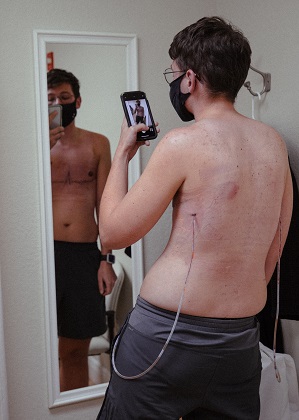User blogs
Top surgery is a procedure for transgender men to remove breast tissues. It is also known as masculinizing chest surgery because it reconstructs, removes, and tailors the breasts to make them appear masculine.
What Is Top Surgery?
 If your breasts are small, you may be able to have surgery that spares your skin, nipple, and areola. This means that your nipples and areola will not be taken off, resized, and implanted back into position. However, if your breast size is large, you will have to undergo the surgical process.
If your breasts are small, you may be able to have surgery that spares your skin, nipple, and areola. This means that your nipples and areola will not be taken off, resized, and implanted back into position. However, if your breast size is large, you will have to undergo the surgical process.
Why is this Transition Process Performed?
Most transgenders feel their expression or experienced genders are different from their current bodies. To ease off this discomfort and out-of-place feeling, transgender men often opt for top surgery.
Who is Eligible for Top Surgery?
Top surgery is a serious, life-changing process that needs to be planned and considered quite carefully. Planning for transition is very important. People also have to consider the limitations of the procedure as well.
Children under the age of 18 years are not allowed to undergo this surgery, even if parents and families show support. For youngsters. this is forbidden in all states and anyone found guilty could face serious charges. In the same cases, some doctors advise adults against this surgery too. These are usually due to prolonged health problems or difficult procedures.
How High School Educators Can Help You Understand the Process?
The transition process begins when you first learn about it. You can find a lot of published work in the form of research that can help you understand it.
Many transgender persons are aware of gender dysphoria as early as 16 years of age. Schools and other resources are gradually making an effort to include this in their sex education curriculum. Teachers can also collaborate with relevant resource centers so that more children, parents, young adults are aware of this surgery.
What Goes into Transition Planning?
Medical researchers have published many writings on the subject of transition. They have explained the different procedures available, in simple words and with details as well. You can also get information regarding the transition from your nearest resource center.
There are a lot of resources available on the subject. People can find out everything from the structure of the breasts to the procedure required to remove them. In case anyone is interested, they can also look for support groups. This way, it can become easier to deal with the challenges of the transition surgery.
You can also go through helpful links and sources to get a better idea about the transition. Ultimately, a medical expert is your best bet to understand the needs and requirements of the surgery.
A physician or surgeon will conduct necessary tests to make sure that the person is eligible for the transition. After which, they will provide them with the result and also offer guidance about the process.
To make sure you know what you’re in for, it’s best to consult with your doctor. You can get tips or voice your concerns regarding your transition directly. Here are 8 questions you should ask your doctor before undergoing transition surgery to avoid trouble in the future.
What Type of Top Surgery Procedure Would Suit Me?
 As mentioned previously, each body type is different. So, it’s important to ask your doctor what transition procedure is best suited to your goals and needs. Keep in mind that a child and adult transition are entirely different things.
As mentioned previously, each body type is different. So, it’s important to ask your doctor what transition procedure is best suited to your goals and needs. Keep in mind that a child and adult transition are entirely different things.
After a quick analysis, your doctor will be able to explain the various types of available solutions. They will also discuss the importance of the one you require, and why to opt for it.
What Are the Risks and Complications?
Transgender people have to face a lot of issues even after getting top surgery. A quick search will give you an idea of the risks and complications involved with top surgery. For instance, the possibility of developing a seroma or hematoma.
Your doctor will focus on your particular body type and answer these questions accordingly. Moreover, there are certain food items like beef jerky that cannot be consumed.
They may also guide you through the symptoms you need to look out for. Medical professionals also give tips and explain how to manage complications if they occur to eliminate fear.
What Are ‘Dog Ears’ and How to Avoid Them?
Since ‘dog ears’ are a common reason for revision surgery, you should get a general idea about what they are by discussing it with your doctor.
This is basically a phrase that’s used to refer to excess skin and fat that ‘pop’ out at the incision line. It goes around the side of the chest in Double Incision Top Surgery.
You should inquire if dog ears are a part of your surgeon’s revision surgery policy. The cost of revision surgery can actually be higher than the actual one.
What Happens on the Day of the Surgery?
Once the person reaches the hospital site and checks in, the process begins. Depending on the procedure (double incision, periareolar, or keyhole), the surgery can last between 1.5 to 4 hours. You can ask your doctor questions about the surgery itself or post-procedure care and estimated recovery time.
How to Receive Transition Help?
Parents play an important role in their kids’ lives. Every child requires love and attention but those who are struggling with transition, need it the most.
The first place most youngsters will look for help is among their families and friends. Apart from parental figures, a teacher in college, university, and any other academic institutes play a significant role too.
However, if you think you are unable to get the right kind of help, you can always contact your surgeon to help you find resource centers and support groups. Usage of transitional words and other words of encouragement is also equally important.
Education and knowledge need to be given to kids and adults alike. For example, teachers organizing seminars for their students might prove to be beneficial as they grow up.
Do You Need to See a Therapist Before Undergoing Surgery?
Top surgery and the transition process are an emotional procedure that comes with many challenges. In order to make sure you are mentally fit for the procedure, many surgeons require a letter from a mental health professional. This gives them an assessment of your state of mind. Since you will require a lot of mental stability and strength later on as well, you can try out a few techniques by yourself as well. The 10 minutes awakening program is a tried and tested solution for achieving mental peace and a boost in confidence as well.
Do I Need to Stop Taking Testosterone?
Before your surgery, the surgeon will provide you with some guidelines and tips that may require you to stop certain foods, testosterone, and smoking.
Will I have Drains After the Surgery?
Most people believe that drains and top surgery go hand-in-hand. However, some surgeons don’t use drains so whether or not you get them is entirely dependent on the type of procedure.
Finally, you may wonder how much pain you’ll go through during or after the surgery. This contrasts from person to person though usually, it is less than moderate. Furthermore, your surgeon will brief you with post-operative instructions and how to take care of your incisions in a proper manner.
What More to Do?
You must understand the service, procedure, and any complications you may develop during your transition process. This way, the pre-and post-transition process will feel like a breeze. With tips from your doctors and necessary precaution, you can successfully complete the transition surgery without facing any issues.
Trans man chest reconstruction surgery is a solution for transgender men, especially for individuals who wish to achieve a more masculine appearance. This surgery is done by removing the breast or just reducing its size.
Masculinizing Chest Reconstruction
The ultimate goal of this procedure is to align your physical characteristics with your internal self-recognition and how you want the world to see you. The relief surgery gives to make you feel comfortable, and enhance your feeling of self-esteem and body confidence.
Surgical procedures have potential complications and intricacies; it is crucial to maintain realistic expectations. It is almost impossible to predict the outcome of Trans man chest reconstruction surgery or the changes that might occur post-surgery. For lots of trans men, binding of the chest tissue can cause a variety of health issues. There can be issues of reduced lung capacity, and even broken ribs if improper techniques are used. Choosing a reputable surgeon and knowing what results to expect is a way to ensure you’re receiving the highest standard of care.
Take Risks
There is no better way of building self-confidence than taking risks. Taking risks shows that you are confident in yourself and your abilities. However, you do not have to do something scary or dangerous to achieve this. Simply getting out of your comfort zone and trying something new would be enough. In essence, this point is all about living your life to the fullest. You may not like the outcome of something you do, but you may forever regret not giving yourself the opportunity to try.
Trans man chest reconstruction surgery is a life-changing experience; it will take time for your chest to heal and go into its new position - sometimes up to a year. Another vital thing to note is that some added procedures might be necessary to give you the result that you desire. Generally, the success rates of this surgery are in the percentage of 90s.
Eventually, your next step for legal
transition will be to change your gender marker. Now, this part is
significantly more difficult and varies wildly from state to state. Some states
are relatively simple, while others are a right pain in the butt. For example,
I am very privileged to have done all this in Minnesota, which has one of the
more trans-friendly laws regarding gender change. For me, I had to consult with
a physician about my gender identity and present a document from her verifying that she believes my gender identity
to be valid (though ironically, the Judge presiding over my case didn't even
ask for it! Don't gamble on that though  ), alongside dotting my I's and
crossing my t's of course. I got it changed on my social security card, my
birth certificate, and my photo ID.
), alongside dotting my I's and
crossing my t's of course. I got it changed on my social security card, my
birth certificate, and my photo ID.
Unfortunately, not every gender change is going to be that simple. A lot of states require that you undergo gender reassignment surgery before you are allowed to change your name, which is both cost-prohibitive for many, but also not something that every trans person wishes to undergo. Some states will also require that your gender change is noted on your birth certificate (mine did not, thankfully). Of course, knowing how the United States can often treat trans people, it should not be surprising at all to find out that a few states are not interested in trans rights beyond seeing the advance of these rights as a threat.
In Kansas, Ohio, and Tennessee, a person cannot change the gender on their birth certificate to match their gender. In all three, however, a person may still change the gender on their driver's license just by having a notice from their physician verifying their gender identity. Kansas has laws that prevent changes to a birth certificate other than minor changes, and Tennessee is the only state to specifically bar trans people from changing their gender marker.
 It's not all bad though, because at least
driver's license gender change laws are significantly less stringent.
Unfortunately, you will still have to deal with some rigmarole depending on
your state. Luckily, states generally do not require SRS in order to get the
gender marker changed on your driver's license, meaning that you will still be
able to present as your gender in public if you can't change it on your birth
certificate. The conflict with states not allowing birth certificate changes
can present complications, however; for instance, if you were born in Ohio and
moved to Kentucky, Kentucky law requires that your driver's license's marker
match your birth certificate's.
It's not all bad though, because at least
driver's license gender change laws are significantly less stringent.
Unfortunately, you will still have to deal with some rigmarole depending on
your state. Luckily, states generally do not require SRS in order to get the
gender marker changed on your driver's license, meaning that you will still be
able to present as your gender in public if you can't change it on your birth
certificate. The conflict with states not allowing birth certificate changes
can present complications, however; for instance, if you were born in Ohio and
moved to Kentucky, Kentucky law requires that your driver's license's marker
match your birth certificate's.
While we are admittedly in a bit of a sour spot in history for trans people with the election of Donald Trump to the presidency and setbacks on trans rights, trans people have seen many legal victories in recent years. For example, before April of this year, Idaho was alongside Kansas, Ohio, and Tennessee in denying trans people the right to change their gender marker on their birth certificate. However, a subsequent lawsuit and decision by an Idaho District Court Judge resulted in Idaho law being changed to the effect that trans people's request to change their gender marker is not automatically denied anymore. Not only that, but SRS is not required, and neither is a notation of the gender having been changed. There are lawsuits against other such laws, including Ohio, so we may well see laws relaxed.
Because of the complexity of laws regarding changing your gender, such an article cannot and should not be used as your sole source of information. In order to get a proper understanding of your state's laws, check out here... Changing Birth Certificate Gender Designations: State-By-State Guidelines.
